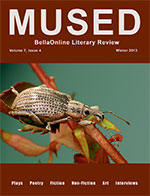J. Scott Shields - In His Own Words
When discussing poetry with my high school students, we often talk about the features of certain poems that make them memorable and help them to endure. To me, good poems—the kind that resonate in people’s minds and speak to generations of readers—are those that cause the audience to see something in a new way.
I liken this experience to looking at the world through a magnifying glass. A person may perceive the world through any number of means (i.e., the naked eye, through binoculars, in moonlight or under a black light, etc.). Yet if people look at something with a magnifying glass, they are likely to see it differently. The image at the edges of the lens may appear distorted or unfocused, but the object in the center will come into view in ways that may have been either unnoticed or unnoticeable beforehand.
Likewise, a good poem will bring fresh insights into even the most commonplace experiences. Regardless of a poem’s form—be it an ode or an elegy, a ballad or a nursery rhyme, beatnik monologues or Elizabethan blank verse—the best works communicate in ways that tap into the essence of what it means to be human. They cause us to slow down and focus our attention on those things that might otherwise be overlooked, and it is by seeing the world in new ways that we are reminded of how much there is to contemplate and enjoy.
I came to poetry rather late in my writing life. For twenty years or more, I wrote primarily fiction and academic prose. Yet I have always loved language and wordplay, and from my earliest days, I remember being fascinated by the rhythms and rhymes associated with music and songs. At some point I realized that certain ideas I wanted to express could not be contained within a story, so I explored ways to bring those experiences to life through poetry. Since then I have worked with different poetic forms, such as free-verse, sonnets, villanelles, and haikus, (although I would certainly not consider myself a master of any of them), and I enjoy the challenge of working with formal poetic structures.
Typically when an idea for a poem takes root in my mind, it will come in the form of an image or a phrase. I like to use a pencil and paper in this early phase, although I am not entirely sure why. Perhaps it is because the tactile connection between my hand and the page feels more organic than a keyboard. In the same way, I usually compose the first draft of a poem outdoors—either in the nearby forests or desert, or on my backyard patio.
I like to let the words dictate the form the poem will take, and as the phrases emerge, so do the stanzas and line breaks. This process usually lasts through several drafts and multiple sheets of paper, but it is not until I settle on a finished version that I type it into my computer. This is a sharp departure from the other writing I do, which starts with me sitting at a computer and ends with a hand-edited final draft.
For me, writing has become an integral creative outlet. It is never easy, but it is tremendously satisfying, regardless of whether I am writing for my own personal amusement or for the enjoyment of others. Perhaps one day, I will write something that teachers will show to their own students so that they might discover new insights about themselves and our world.

